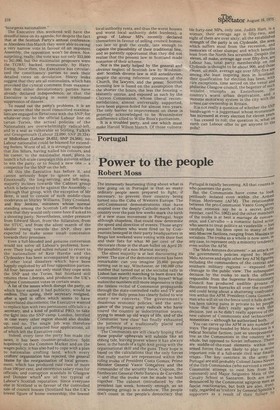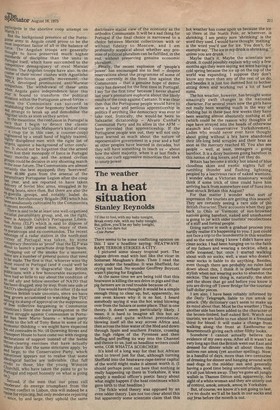Por tugal Por tugal
Power to the people
Robert Moss ,•••••
The immensely heartening thing about what is now going on in Portugal is that so many ordinary people seem prepared to fight, if necessary, to prevent their country being turned into the Cuba of Western Europe. The anti-Communist demonstrations that have erupted over the deeply Catholic north of the country over the past few weeks mark the birth of a new mass movement in Portugal, huge although shapeless, that could now determine the speed and direction of events. Those angry peasant farmers who were fired on by Communists besieged in their party headquarters in Braga last weekend were voting with their feet and their fists for what 80 per cent of the electorate chose in the sham ballot on April 25: the possibility of a non-Marxist society.
The silent majority is at last discovering its power. The size of the demonstrations has been remarkable: can you imagine 25,000 people turning out in say, Winchester, or 100,000 (the number that turned out at the socialist rally in Lisbon last month) marching to burn down the Communist Party offices in King Street? What makes the numbers still more impressive is that the tireless recital of Communist propaganda through the state-controlled radio and TV and most of the daily press has clearly failed to win many new converts. The government's disastrous economic policies, and the arrogance of the young army radicals who have toured the country in indoctrination teams, trying to smash up old ways of life, and of the Communist 'new class' has finally exhausted, the patience of a traditionally placid and long-suffering peasantry.
The Communists are still clearly hoping that these popular upheavals will subside like an ebbing tide, leaving power where it has always been: in the hands of a tight-knit group with the organisational skill and the guns. Their hope is based on the calculations that the only forces that really matter are represented within the ruling troika of President Costa Gomes, Prime Minister General Vasco Goncalves and the commander of the security force, Copcon, the flamboyant General Otelo Saraiva de Carvalho and that the troika can be made to hold together. The cabinet (introduced by the president last week, honestly enough, as an uninspiring group) is a sideshow. The people don't count in the people's democracy that Portugal is rapidly becoming. All that counts is who possesses the guns. But the Communists have come to look perilously isolated even within the Armed Forces Movement (AFM). The relationshiP
between the pro-Communist Vasco Goniaives (whose enemies say he is a secret partY
member, card No. 1062) and the other members
of the troika is at best a manage de convertance, and Carvalho a romantic failed actor who seems to treat politics as vaudeville has
carefully kept his lines open to many of the anti-Moscow factions, ranging from Maoists to socialists. The troika as a whole is now seen, in any case, to represent only a minority tendency even within the AFM.
The 'Melo Antunes document' an attack on the government's policies signed by major
Melo Antunes and eight other key AFM figures,
including the commanders of the central and southern military regions exposed the
cleavage to the public view. The subsequent decision by the troika to sack the officers responsible from the Supreme Revolutionaq Council has produced audible groans el discontent from barracks all over the countrY and could bring about a shattering confrontation within the AFM. President Costa Gomes, man who will sit on the fence until it falls down' has been taking pains in private to let peoMe know that he didn't really agree with this decision, just as he didn't really. approve of th,e new cabinet of Communists and technocratic nonentities although he authorised both. f You can carve up the AFM in any number ° ways. The group headed by Melo Antunes is 3 radical Socialist faction, just as unrepresentative as the Communists in the country as a whole, but opposed to Soviet influence. These are middle-of-the-road elements within the armed forces that are likely to play a more important role if a full-scale civil war finai'„Y erupts. The key centrists in the armY Portugal are still probably Colonel Jaime Neve' of the 11th Commandos (who survived a recent Communist attempt to oust him front his command) and Major Salgueiro Maia of the Cavalry School at Santarem. Both are nevi denounced by the Communist agitprop men a.s fascist reactionaries, but both are also, Men!'
e cally, regarded as 'traitors' by General Spinola s supporters as a result of their failure tc! Participate in the abortive coup attempt on March ii.
But the background presence of the Portuguese army in Angola could prove to be the 1,11ost important factor of all in the balance of !Orce. The Angolan troops are generally tnought to have preserved much higher s,tandards of discipline than the units in _rortugal itself, which have succumbed to the ropetitive demagoguery of rival Marxist ractions. The Angolan troops have also, in the emourse of their -recent clashes with Agostinho .O's pro-Soviet guerrilla movement, the '`Let, developed pronounced antitNarxist 'YmPathies. The withdrawal of these units „when Angola gains independence later this 'ear is bound to transform the political situation within the Portuguese armed forces unless the Communists can succeed in establishing their clear hegemony before then d arrange to break up and demobilise the mgolan units as soon as they arrive. In the meantime, the confusion in Portugal is such that I begin to detect the classic conditions for Curzio Malaparte's kind of coup a coup (or in this case, a counter-coup) eLngineered by a small band of highly trained, ,41gblY disciplined men with the right list of 'gets, against a background of utter confu n. It should not be forgotten that the armed ,°rces lost their monopoly of force in Portugal '"anY months ago, and the armed civilian groups could be decisive in any shooting match lo the near future. The Communists are almost certainly the best equipped., they 'borrowed' surne 40,000 guns from the arsenal of the paramilitary Portuguese Legion after the coup 1st year, and are reported to have taken te.livery of Soviet bloc arms, smuggled in by „t'shing boats, since then. But there are also the
groups, and notably Isabel do
nno's Revolutionary Brigade (BR) which has !'ten assiduously cultivated by the Communists In recent months. There is said to be at least one well-organised ,SLocialist paramilitary group, and, on the right, ,.'ere is Ampuin Galvdo's Portuguese Libera'On Army (ELP) which is said to dispose of More than 1,000 armed men, many of them "-Paratroops and ex-commandos. The recent sabotage of a radar station in the north-east corner of Portugal was taken, by some c,00spiracy theorists as 'proof' that the ELP was about to launch a parachute drop from Spain. Stepping out of the smoke for a moment, there are a number of general points that need 1° be made. The first is that, whoever wins th 'atest round in Portugal (and it could well be the last one) it is disgraceful that British Politicians, with a few honourable exceptions, have had so little to say about the condition of old ally and fellow-member of NATO that Llas been dragged, step by step, from one side of NATO's ideological divide to the other. (I do not rinention British trade unionists, since we have II3ng grown accustomed to watching the TUC tting its stamp of approval on the suppression uf free collective bargaining in Communist col:Ints.) Since the main protagonist in the recent struggle against Communism in Portugal has been Mario Soares whose party ds to the left of Tony Benn in some of its `':ohomic thinking we might have expected t.ps old comrades in No. 10 Downing Street and ,ransport House to have come out with ringing ,u,eclarations of support instead of the feeble ,ulroat-clearing exercises that have actually Iaken place. But the same strictures apply, by arId large, to the Conservative Party, which .sornetimes appears not to realise that some Itleological battles are indivisible. (But full credit to those, like the young Winston Cpburchill, who have taken the pains to go to c'rtugal and report honestly on what is going on.) Second, if the men that our press call lboderate' do emerge triumphant from the rtlrrent conflict in Lisbon, this will indeed be a cuse for rejoicing, but only moderate rejoicing since, by and large, they uphold the same
doctrinaire statist view of the economy as the orthodox Communists. It will be a sad thing for Portugal if the final choice is narrowed to a choice between Marxist collectivism with or without fidelity to Moscow, and I am profoundly sceptical about whether any promise of political pluralism can be fulfilled, in the end, without preserving genuine economic pluralism. Finally, the recent explosion of 'People's power' has encouraged me to feel despite reservations about the programme of some of those currently in the front line against the Communists that a genuine hope of democracy has dawned for the first time in Portugal. I say 'for the first time' because I never shared last year's premature euphoria about the likely results of the coup against Caetano. It was clear then that the Portuguese people would have to serve a hasty and perilous apprenticeship in politics if anything like democracy was ever to take rbot. Ironically, the would-be heirs to Salazarist dictatorship Alvaro Cunhal's Communist Party and its allies in the AFM have provided that apprenticeship. If the Portuguese people win out, they will not only have learned as much about the nature of representative government in a year and a half as other peoples have learned in decades, but they will have something to teach us about how the silent majority, when it at last finds a voice, can curb aggressive minorities that seek to usurp power.



































 Previous page
Previous page